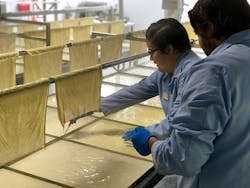Manufacturing in urban areas is on the rise, as evidenced by the expansion of the Bay Area Urban Manufacturing Initiative which has grown from four cities in 2016 to now 26 cities.
A project of nonprofit SFMade, the Initiative’s goal is to “facilitate the creation of a well-defined and interconnected regional manufacturing ecosystem.”
“With the Bay Area at the epicenter of technology and design and rich in industrial commons, manufacturing growth across our region now outpaces both the nation and California as a whole,” said Kate Sofis, CEO of SFMade. “These cities have banded together to continue that momentum because when manufacturing does well in the Bay Area, the entire region benefits.”
With funding from Citi Community Development, Kaiser Permanente and PG&E, part of the goal of the Initiative is to grow the number of middle-income jobs and create a more equitable and diverse regional economy.
Collaboration leaders presented research on local manufacturing, prepared by JLL. Highlights include:
- The Bay Area region employs more than 340,000 manufacturing workers, representing 10% of the local workforce.
- More than 7,500 manufacturing companies operate in the Bay Area.
- Manufacturing-related salaries in the Bay Area are reported up to $150,000 per year.
- Food and Beverage production is the number one sector manufacturing in the region.
“The manufacturing sector is alive and thriving in the Bay Area, home to thousands of companies bringing creativity and stability to cities and creating opportunities for people from a variety of backgrounds and with a variety of backgrounds and skills,” said Vicki Joseph, Northern California Region Market Manager for Citi Community Development. “The Bay Area Urban Manufacturing Initiative is not only uniting cities on a regional level to support urban manufacturing, it is sharing and replicating tested strategies for creating jobs and building a more robust, connected and inclusive economy.”
The group also announced that a top policy priority is to support allocating state resources to fund technical assistance to small and medium-sized manufacturers.To that end, the group released how-to guides to give city staff, policymakers, and partner organizations concrete tools to increase engagement with their manufacturing sectors. These strategies were illustrated by case studies – some of which were best practices shared by economic development departments within the collaborative.
Minh Tsai, CEO of Oakland’s Hodo Soy, which employs 130 workers, noted, "As interest in our brand and our delicious products grows nationally, we would like to continue creating meaningful jobs with great benefits for the folks in Oakland. Giving employees a meaningful wage is the first step; next, the flexibility to take care of their kids and to enroll in English classes; then comes health benefits and our 401k program. Hodo commits to supporting a pathway to a middle-class livelihood for all our employees and their children."
About the Author
IW Staff
Find contact information for the IndustryWeek staff: Contact IndustryWeek
